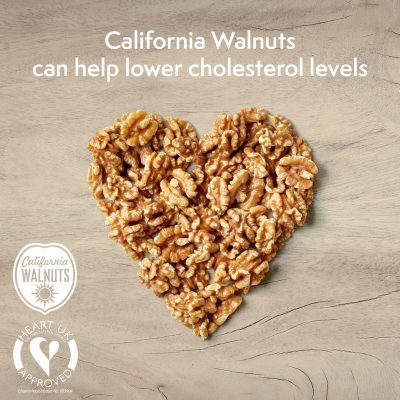
Heart Health
Heart Disease remains the number 1 cause of death in the UK with 160,000 people dying from heart and circulatory disease every year. 1 The good news is that many of the risk factors associated with heart disease can be controlled with dietary and lifestyle changes. 2
Since 1993, published research has been investigating how eating walnuts affects various heart health biomarkers and risk factors including:
- Cholesterol
- Blood Pressure
- Inflammation
- Endothelial function
- Plaque formation
Eating walnuts as part of a healthy diet may decrease your risk of heart disease. Walnuts help maintain healthy cholesterol levels and decrease blood pressure, two of the major risk factors for heart disease.3,4 They are also a rich source of plant-based Omega-3 alpha-linolenic acid (ALA). Walnuts are unique among nuts as they are the only tree nut significantly high in Omega-3 with 2.7 grams of ALA per 30 gram serving.
When eaten as part of a Mediterranean dietary pattern (a diet rich in fish, vegetables, fruits, whole grains, olive oil and nuts, legumes and beans) walnuts may lower risk of both heart disease and stroke. A recent study shows that a Mediterranean diet including tree nuts, primarily walnuts, was associated with a 30% lower risk of cardiovascular events (heart attack, stroke, or death) and specifically a 46% lower risk of stroke, when compared to a low-fat diet.5
Heart Health Claims:
- California Walnuts have the heart-healthy seal of approval from Heart UK* – the cholesterol charity. 6
- The EU has confirmed that a handful of walnuts a day (30 grams) can have a positive effect on the elasticity of the blood vessels and can thus help with keeping the cardiovascular system healthy. 7

How to include walnuts in a healthy diet to help lower your risk of heart disease
- Include walnuts in meals and snacks, along with a diet low in saturated fats.
- Choose walnuts to snack on four to five times per week. Just a handful of nuts (30g) will make you feel satisfied.
- Sprinkle chopped walnuts on salads, porridge, yoghurt, vegetables, in dips, or as part of mixed dishes.
- Try new recipes using walnuts by going to the California Walnuts recipe page to see how great chefs have used walnuts in heart-healthy recipes.
- Walnuts can be used as a meat substitute in many recipes.
*Read more about the approval with Heart UK – the cholesterol charity

